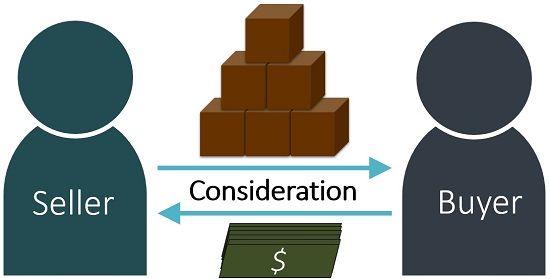This article has been written by Srijita Adak, pursuing a Diploma in Advanced Contract Drafting, Negotiation, and Dispute Resolution from LawSikho.
Table of Contents
Introduction
Normally you will find someone every day saying give me two packets of biscuits in a shop, could you courier this book in a courier center, someone is ordering pizza on Swiggy or Zomato, etc. which is a contract. That means on an everyday basis you may not encounter laws such as IPC, Constitution, Company Law, etc. But you do enter into many forms of oral, written, implied, and expressed forms of contract. That is why contracts are such an interesting aspect. For a contract to be legally valid, it must have a consideration otherwise the contract is void and unenforceable except in some situations laid under Section 25 of the Indian Contract Act,1872.
Another important aspect of consideration is past consideration. Past consideration implies that the consideration for any promise was given before and the promise is made from thereon. For instance, A lost his dog and B found the dog and returned it to A, then A promised to pay Rs.100 and in that case, it will be a past consideration as the act of finding the dog happened before any agreement. The knowledge of past consideration is essential because the laws of past consideration in India and England are different. Section 25(2) of the Indian Contract Act,1872 defines that the past consideration is valid in India. But under English law, past consideration is not valid, which causes a ton of burdens, as though an individual would pay for the past act then he will need to consider the past consideration only as gratitude.
What is consideration?
An enforceable contract requires consideration, sometimes called the “price of a promise” or part of a “bargained-for exchange”. One party gives something of value to a counterparty or accepts a detriment to induce a promise from the counterparty. Consideration is necessary for forming a contract. Consideration may take the form of a money payment, a delivery of goods, a promise of money payment.
Section. 2(d) of Indian Contract Act,1872 says that when, at the longing of the promisor, the promisee or some other individual has done or avoided doing, or does or swears off doing, or vows to do or to keep away from doing, something, such demonstration or forbearance or promise is known as a consideration for the promise.
Illustration
A promises to sell a car to B and B promises in return to pay Rs. twenty thousand. Now the promise to sell the car is supported by a return promise and it is a contract. The returned promise of Rs. twenty thousand is the consideration or price of the promise to sell the car. As it is an enforceable contract supported by consideration, if A breaches the contract B can sue him because A broke a legally enforceable contract.
A promises to type the manuscript of B’s book and in return B promises to teach him for a month. The promise of each party is the consideration for the promise of the other party.
A promises B not to file a suit against him if he pays him Rs. 500. The abstinence of A is the consideration for B’s payment.
What is past consideration?
Consideration from the past which was not provided to induce a promise is “past consideration” and usually does not create an enforceable contract. Where the promisor had received the consideration before the date of the promise, the consideration is past consideration or executed consideration.
It is also called moral consideration. For example, that you’re going for a stroll and see someone has fallen and got hurt. You at that point went to help the harmed individual and assisted them with medication. To show their appreciation, the other individual promises to pay you Rs. 1,000. The guide that you have given the harmed individual would be considered past consideration. Despite the fact that you were not lawfully needed to help them, you felt ethically and morally committed, and your satisfaction of this ethical duty brought about you being paid.
Illustration
A is a doctor. B is a patient. B was brought to A’s dispensary. A rendered his services for ten days. After ten days B promises to compensate A for the services rendered to him. It is past consideration. A can recover the promised amount.
A looks after the children of B at B’s request. A year later B agreed to pay A. a sum of Rs. 2000 for his services. For the promise of B, the services of A will be taken as past consideration.
A rendered some services to B in the month of June. In July, B promised to pay A Rs. 500. The consideration of A is past consideration.
Importance of past consideration
Knowledge about past considerations is very important. Because in day-to-day life we enter into such a contract where we cannot get the consideration as it is past consideration. Past consideration which as normal rule isn’t satisfactory to make a promise confining. In such a case the promisor may by his promise see a moral responsibility which is not a consideration, anyway, he isn’t obtaining anything as a trade-off for his promise because he as of now has it before the promise is made.
As far as a contract, past consideration is utilized to mean a guarantee or a demonstration that was executed or made preceding the contract. Past consideration ordinarily becomes an integral factor when somebody is attempting to uphold another new promise. At the point when another promise is composed, past consideration won’t be considered for the validity behind the agreement. The justification for this is that past consideration happened before the new agreement came into force, which means it couldn’t have been accommodated for the new agreement.
Past consideration can’t be remembered for an agreement generally in light of the fact that it didn’t profit the promisor or represent any danger to the promisee. For a contract to be legitimate, it totally should incorporate good legitimate consideration. In a two-party contract, for instance, the two parties included should guarantee something, regardless of whether it is a particular demonstration or a consent to pay a specific measure of cash.
Whether past considerations are valid or not?
Past consideration in Indian law
In India, past consideration is a good consideration. It is sufficient to support a promise. Section 2(d) of the Contract Act clearly lays down that consideration may be past, present or future. Hence an agreement based on past consideration is perfectly valid in India.
In Sindha v. Abraham, A rendered services to B during his minority at B’s request; which were continued after B ceased to be a minor. After attaining a minority, B promised to pay an annuity to A for the services rendered in the past. It was held that this was a good contract and A can recover the money.
In Siva Saran Kesava Prasad’s case, a legal advisor gave his training and filled in as supervisor of a property manager at the latter’s request in lieu of which the landowner hence guaranteed a pension. It was held that there was acceptable past consideration.
Past consideration in English law
The English law does not recognize a past consideration. In English, Law consideration may be present or future but not past. Past consideration is no consideration at all in English Law. Hence an agreement based on past consideration is void. Consideration may be executory but it must not be passed.
In Roscarla Thomas, A purchased horse from B. The price was paid and the horse was taken home. Afterward, A and B met at a place where B said that the horse was young, sound, and free from vice. But when approached the horse. he received a hard kick. A then filed a suit for breach of promise. It was held that the consideration given at the time of contract of sale, was no consideration for the subsequent promise and hence the promise was unenforceable.
In Re McArdle, a father in his will gave his house to his five sons after their mother’s death to share equally. During the mother’s lifetime, one of the testator’s sons and his wife lived in that house. At that time the wife incurred an expense of £ 488 to make some improvements in the house. Subsequently, all the five sons signed a document to share the amount spent on such improvements. On the mother’s death, they refused to pay expenses except for her husband. It was held by the Court of Appeal that since the consumption had been brought about before the report was signed, that was past consideration and thus the promise could not be authorized.
Exceptions to the rule that past consideration is no consideration
There are, nonetheless, certain special cases for the standard rule that past consideration is no consideration.
Service is done by request
Services delivered in line with the promisor when the consideration comprises services delivered in accordance with the promisor, it is a good consideration. The request may be either expressed or implied.
In Lampleigh v Braithwait, the respondent killed somebody and asked the petitioner to try and acquire an apology for him from the King. The claimant rode about the country on horseback to try and find the King which took a long time and a lot of expense. The claimant found the king and obtained the pardon. The claimant gave the pardon to the defendant who promised him £100.00 for his work. The defendant didn’t pay up. The defendant argued that past consideration was no consideration but the court held that it had been implied at the time. The past benefit had been conferred at the defendant’s request and the claimant could reasonably expect to be paid for it. Both parties would have understood at the time that payment would be due. Thus, the agreement to pay was held enforceable.
Promise to pay a time-barred debt
When a debt is barred by limitation, the debtor can waive the benefit of that plea and promise to discharge the debt. Such a promise is enforceable. A time-barred debt can be taken as valid consideration for a subsequent promise.
A owes Rs. 1,00,000 to B, but the debt is time-barred under the Law of Limitation. Even so, if A gives a written promise to B to pay 50,000, it is deemed a valid contract.
Negotiable instrument
Where a negotiable instrument is given in consideration of some past act, the last act will form as a good consideration for the issue of the negotiable instrument, and the party who gets the instrument can legitimately authorize it.
Conclusion
The most essential element in a contract. In the event that one party wilfully does an act before the promise came into the picture, the consideration, in that case, will be past consideration. The past consideration gives a wide scope to the consideration as an essential element of a valid contract.
For the most part, English law doesn’t accept past considerations. Past consideration cannot constitute consideration and would therefore make the document invalid. As far as mutual consideration, that must be something where each party must do something or act on the promise of another, so neither party is bound unless both are bound. It is very clear-cut that past consideration does not constitute consideration at all. But there are exceptions that the past consideration is a good consideration under English law.
References
- https://blog.ipleaders.in/consideration-under-the-indian-contract-act-1872/
- https://qsstudy.com/business-studies/types-of-considerations-with-an-example
- https://www.studymode.com/essays/Legal-Rules-Of-Consideration-1135821.html
- http://www.legalservicesindia.com/article/1600/Importance-of-Consideration-in-Contract.html
- https://www.lawteacher.net/free-law-essays/consideration-law/consideration-in-contract-formation.php
Students of Lawsikho courses regularly produce writing assignments and work on practical exercises as a part of their coursework and develop themselves in real-life practical skills.
LawSikho has created a telegram group for exchanging legal knowledge, referrals, and various opportunities. You can click on this link and join:
 Serato DJ Crack 2025Serato DJ PRO Crack
Serato DJ Crack 2025Serato DJ PRO Crack










 Allow notifications
Allow notifications


